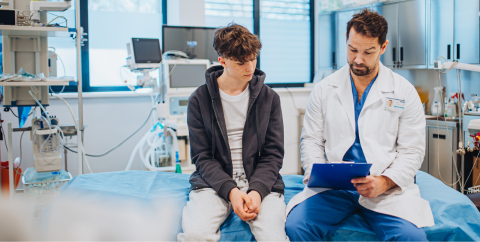Thrive Tips: What to do when someone you know has been diagnosed with cancer
02 February, 2022
When someone is diagnosed with cancer, be it a friend, family member, or coworker, it can be difficult to know just what to do. The impulse might be to tell them “It’s going to be ok” or to “Look on the bright side,” but for the person who’s been diagnosed, there may not be a bright side just then. It might not be ok.
Some of the other not helpful things:
- Rattling off a list of other people you know who’ve had cancer.
- Suggesting alternative therapies or nutrition plans.
- Comparing their diagnosis or experience to your own, different experience.
- Falling down a rabbit hole of resources on the internet and providing a long list of suggestions.
A cancer diagnosis can turn a person’s life upside-down. Letting them know you’ll be there for them is one way to let them know their relationships won’t be part of the great tumult.
“Be present with them,” says ThriveNV navigator Amy. “Listen and be a safe space for them to be vulnerable.”
One way to do this is by simply stating that you’re there for them and willing to just sit and listen. Doing this once is great but maintaining that safe space can mean a lot to someone facing a cancer diagnosis and treatment. Consider setting up a weekly or monthly check-in, then stick with it and be emotionally available to commit that time.
ThriveNV navigator Valerie agrees. But adds that sometimes what someone really needs is space and time to process their feelings. That may also be what you need. Attending a support group for caregivers or friends and family can help you to process your own feelings, and hopefully set you up for greater success in supporting your loved one.
Amy says it’s also important to try not to feel like you have to "fix" what they are going through, because you can't.
“What you CAN do is be the friend, confidant, and cheerleader in their corner. When someone is newly diagnosed there are a lot of unknowns, so be a constant during the ups and downs by finding practical ways to help, while maintaining the relationship you already have with the person is key,” she adds. “Find meaningful ways to connect so the person feels truly seen and heard.”
If the person diagnosed hasn’t yet gone to their first medical appointment post-diagnosis, Valerie suggests asking if they need support during the appointment. That could look like being a secretary to take notes during the appointment and ask clarifying questions. It could also look like just holding their hand.
It’s important to remember that each person is unique in the amount and type of "help" they want to receive from others will be different. Before jumping in, ask what they need and how you can help, then respect their wishes and check back as their needs will likely change.
Some ideas of support that are practical and can help relieve stress include:
- Helping with carpool for children who have school or sports practice.
- Setting up a Meal Train or offering to pick up online grocery orders.
- Walking the dog or helping care for animals.
- Helping with transportation to appointments.
- Being a point person for communication and updates.
Perhaps the most important thing to remember is that everyone is different and every cancer diagnosis is different. Valerie notes that the best way to approach a friend or loved one who has been diagnosed with cancer is through open communication. Ask them what they need and let them know you’re there for them.
You May Also Like

Cancer in Nevada: What the latest national data means for prevention, early detection and survivorship
01.26.2026
Each year, the American Cancer Society releases its annual

Survivorship care plans linked to better long-term outcomes for childhood cancer survivors
11.07.2025
Thanks to advances in treatment, more children are surviving cancer than ever before — with nearly 580,000 childhood cancer survivors expected to

Patient Navigation Training Now Offered in Spanish
10.29.2025
The GW Cancer Center launched a fully translated Spanish version of the free on-demand course titled